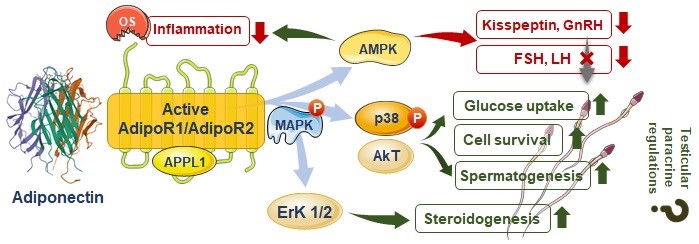
Adiponectin: ‘a metabolic ballcock’ modulating immune responses and male reproduction
Abstract
One of the most prevalent serum adipokines, adiponectin, is well-known for its function in regulating insulin sensitivity and preventing metabolic syndrome from developing. Adiponectin is expressed in numerous components of the testis and studies claim that adiponectin may have positive paracrine effects on testicular functions. Adiponectin, on the other hand, inhibits the hypothalamic-pituitary-gonadal (HPG) axis thereby that may affect testicular testosterone production. It is a strong anti-inflammatory and antioxidant molecule that may have beneficial effects on the male reproductive in addition to its metabolic functions. In obese men, reduction in adiponectin levels may partly decipher the multitudinous pathways linking obesity-mediated metabolic disturbances, inflammation, and male infertility or subfertility. This article provides an overview of the actions of adipokines in energy homeostasis, metabolic balance, inflammation, and male reproduction, hence drawing a connexion between obesity-mediated dyshomeostasis in metabolism and immune functions and male reproductive disruptions.
Keywords
Full Text:
PDFISSN 2347–9825
Authors/visitors are advised to use Firefox browser for better experience of journal site.
Open Access: Researcher from developing/low economy countries can access the jorunal contents through WHO-HINARI .
 ISSN 2347-9825
ISSN 2347-9825

